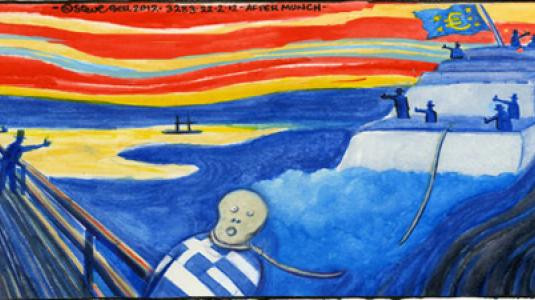
On May 1, 1886, Chicago unionists, reformers, socialists, anarchists, and ordinary workers combined to make the
city the center of the national movement for an eight-hour day. Between April 25 and May 4, workers
attended scores of meetings and paraded through the streets at least 19 times.
On Saturday, May 1, 35,000 workers walked off their jobs. Tens of thousands
more, both skilled and unskilled, joined them on May 3 and 4. Crowds traveled
from workplace to workplace urging fellow workers to strike. Many now adopted
the radical demand of eight hours' work for ten hours' pay. Police clashed with
strikers at least a dozen times, three with shootings.
At the McCormick reaper plant, a long-simmering strike erupted in violence on May 3, and police
fired at strikers, killing at least two. Anarchists called a protest meeting at
the West Randolph Street Haymarket, advertising it in inflammatory leaflets, one
of which called for “Revenge!”
The crowd gathered on the evening of May 4 on Des Plaines Street, just north
of Randolph, was peaceful, and Mayor Carter H. Harrison, who attended,
instructed police not to disturb
the meeting. But when one speaker urged the dwindling crowd to “throttle” the
law, 176 officers under Inspector John Bonfield marched to the meeting and
ordered it to disperse.
Then someone hurled a bomb at the police, killing one officer instantly.
Police drew guns, firing wildly. Sixty officers were injured, and eight died; an
undetermined number of the crowd were killed or wounded.
The Haymarket bomb seemed to confirm the worst fears of business leaders and
others anxious about the growing labor movement and radical influence in it.
Mayor Harrison quickly banned meetings and processions. Police made picketing
impossible and suppressed the radical press. Chicago newspapers publicized unsubstantiated police theories
of anarchist conspiracies, and they published attacks on the foreign-born and
calls for revenge, matching the anarchists in inflammatory language. The
violence demoralized strikers, and only a few well-organized strikes continued.
Police arrested hundreds of people, but never determined the identity of the
bomb thrower. Amidst public clamor for revenge, however, eight anarchists,
including prominent speakers and writers, were tried for murder. The partisan
Judge Joseph E. Gary conducted the trial, and all 12 jurors acknowledged
prejudice against the defendants. Lacking credible evidence that the defendants
threw the bomb or organized the bomb throwing, prosecutors focused on their
writings and speeches. The jury, instructed to adopt a conspiracy theory without
legal precedent, convicted all eight. Seven were sentenced to death. The trial
is now considered one of the worst miscarriages of justice in American history.
Inspired by the American movement for a shorter workday, socialists and
unionists around the world began celebrating May 1, or “May Day,” as an
international workers' holiday. In the twentieth century, the Soviet Union and
other Communist countries
officially adopted it. The Haymarket tragedy is remembered throughout the world
in speeches, murals, and monuments. American observance was strongest in the
decade before World War I. During
the Cold War, many Americans saw
May Day as a Communist holiday, and President Eisenhower proclaimed May 1 as
“Loyalty Day” in 1955. Interest in Haymarket revived somewhat in the 1980s.
A monument commemorating the “Haymarket martyrs” was erected in Waldheim
Cemetery in 1893. In 1889 a statue honoring the dead police was erected in the
Haymarket. Toppled by student radicals in 1969 and 1970, it was moved to the
Chicago Police Academy. (From Encyclopedia of Chicago)


